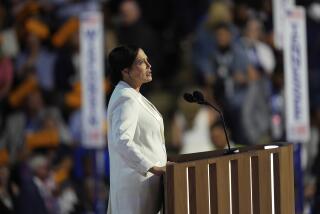ASIA : Japan’s Female Job Applicants Feeling Harassed : Amid economic slump and a tight employment market, women complain of sexual comments from male recruiters.
It’s the toughest job market in years for Japanese college graduates, but Kaneko Komatsu and her friends were still unprepared for the interview questions and comments they received.
“Your legs are fat,” Komatsu, 19, said she was told by one male recruiter for a travel agency.
“If you get cosmetic surgery to make your eyes bigger, we’ll hire you,” another recruiter told one of her classmates.
“Inside, I was so angry and chagrined, but I had to keep up a cheerful exterior,” Komatsu said, as she thumbed through job placement ads at the public Tokyo Student Employment Center this week. “It was an interview, so I just had to put up with it.”
Despite gains women have made in the workplace here, the stubborn economic slump and tight job market have produced a wave of complaints about sexual harassment. Although firms began announcing cutbacks in female job recruits 18 months ago, the sexually tinged comments began appearing more recently as the job market tightened further.
Some women report being asked whether they are virgins or have lovers. When Komatsu’s friend said no in response to such a query, the recruiter said, “That’s because you’re unattractive.” Other women say they are invited to dinner--or hotels--by personnel managers and other men they consult for jobs.
Even women who don’t suffer sexual harassment say they are discriminated against in other ways--by receiving fewer invitations to orientation meetings or less direct-mail material from firms than their male counterparts, for instance.
Such women--and men in the same age range--have been hit by a double whammy. They are entering the job market during one of the worst recessions in Japan’s postwar history. They are also part of the “Junior Boomers,” the children of the postwar baby boom now coming of age and flooding the job market. The number of 19-year-olds hit a peak in 1992; there were 500,000 more men 20 to 24 in 1990 than in 1980.
The result: a scarcity of jobs so severe that national bureaucrats are now scrambling for solutions. The Labor Ministry hosted a massive student recruitment convention at the Tokyo Dome on Thursday, aiming to match up 10,000 student participants with an estimated 670 companies.
*
The ministry also announced it would seek public funds to pay half the salary of new recruits for up to six months as a “training subsidy” for firms that employ them.
The market is so tight that 2,500 women applied for 100 jobs as part-time flight attendants for Japan Airlines, paying just one-fourth the wages of full-time positions. (The airline withdrew the plan, however, after Transport Minister Shizuka Kamei questioned the safety of such a practice and kicked up a political ruckus.)
Women are turning to such options as postgraduate study and overseas jobs. But Tomomi Anzai, 20, an English major, said recruiters no longer seem to view overseas study as an asset because it delays a woman’s entry into the job market--thereby reducing the number of years she can work before marrying and presumably quitting.
In July, about 80 female students staged a protest march in downtown Tokyo, calling for action against sexual harassment. But most women seem to bear their slights in silence. Komatsu, for instance, said that the harassment she experienced was “normal” for Japan’s male-centered workplace and that she’s given up hoping things will change.
More to Read
Sign up for Essential California
The most important California stories and recommendations in your inbox every morning.
You may occasionally receive promotional content from the Los Angeles Times.







